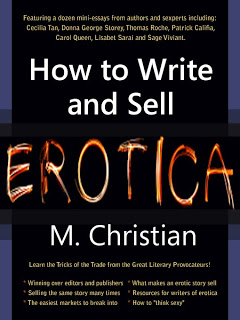Flexing
I’m astounded by writers who write one thing and one thing only: straight erotica, mysteries, science fiction, horror … you name it. Their flute has only one note. They might play that one note very, very well, but they often neglect the rest of the scale. Not to go on about myself, but my own moderate accomplishments as a writer are the direct result of my accepting a challenge or two. I never thought I could write erotica—until I did. I never thought I could write gay erotica, until I did. Who knows what you might be great at? You won’t know until you try.
A writer is nothing but pure potential, but only if that potential is utilized. If you only like writing straight erotica, try gay or lesbian. The same goes if you’re queer: try writing something, anything, that you’d never in a million years think of doing. Maybe the story will suck, and that certainly does happen, but maybe it’ll be a wonderful story or teach you something about your craft.
Challenge yourself. If you don’t like a certain genre, like Romance, then write what your version of a romance story would be like. You don’t like Westerns? Well, write one anyway: the Western you’d like to read. Of course, like a lot of these imagination games you don’t have to sit down and actually write a Western novel. Instead, just take some time to visualize it: the characters, setting, some plot points, a scene or two. How would you open it? Maybe a tumbleweed blowing down a dusty street, perhaps a brass and black iron locomotive plowing through High Sierra snow? Or what about the classic Man With No Name staring down a posse of rabid outlaws? Who knows, you might be the best Western—or mystery, science fiction, gay, lesbian, straight etc.—writer there ever was, or maybe you’ll just learn something about people, about writing. Either way, you’re flexing, and increasing the range of your work.
This flexibility isn’t just good in abstract: look at the books being published, the calls for submissions, and so forth. If you only like to write stories that one are particular style, flavor, or orientation, you’ll notice you have a very, very limited number of places that would look at your work. But if you can write anything, then everywhere is a potential market. Write one thing and that’s exactly how many places will want to look at what you do. Write everything and you could sell anywhere.
In other words: try! If you don’t try, you won’t know if you’re any good. Some writers only do what they know and like because they don’t want to face rejection, or feel they’d have to restart their careers if they change the one thing they do well. I don’t believe any of that. If you can’t handle rejection, then writing is not the life for you. Getting punched in the genitals by a rejection slip is part of the business, and something we all have to deal with. As far as a writer’s career goes, no one knows what shape that’ll take, or what’ll happen in the future. Planning a job path in writing is like trying to roll snake eyes twelve times in a row: the intent might be there, but the results are completely chaotic. In the same way, a simple little story can turn out to be the best thing you’re ever written, or an unexpected experiment can end up being a total artistic change.
Playing with new themes, genres, and styles is fun. Experiment on the page, in your mind, and who knows what’ll pop up? Go to a bookstore and pick up something at random, read the back cover, and then spend a fun couple of hours imagining how you’d write it. What style would you use? What kind of characters? What settings? Even sit down and write some of it: a page, or even just a paragraph or two. It might suck, but that’s the risk you always take trying something new—but it also could open a door to something wonderful.




This looks like good advice, especially considering the writers who became household names writing in a different genre than the one they started in. (Has anyone heard of George Bernard Shaw's novels? Agatha Christie actually started as a romance novelist, and she did continue in that genre after she became a famous mystery writer, but under a different pen name.) Lisabet Sarai has commented in this blog that her contrarian approach to the tropes of erotic writing (e.g. in her novel, The Gazillionaire and the Virgin, the rich person is female, and the inexperienced newcomer with potential is male) hasn't led to the kind of cult following that the big names in certain genres have acquired, but it keeps her work fresh.
As you know, Chris, this could be my mantra.
I've never managed a Western though. Maybe I should try it!